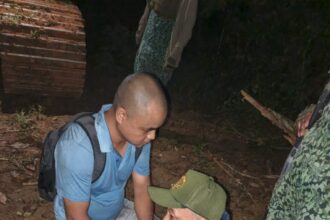Afghan women earned the right to vote more than a century ago. Today, under Taliban rule, they are practically erased from public life and even banned from singing.
These were just some of the chilling observations and testimony from Afghan women, together with supporters from around the world, who convened at UN Headquarters on Monday to discuss inclusion and women’s rights going forward.
“Now, more than ever, it’s crucial to include women in all matters concerning Afghanistan’s future meaningfully,” said former Afghan diplomat Asila Wardak of the Women’s Forum on Afghanistan.
Stressing that the country’s future “cannot be built on the exclusion of half of the population,” she said that “women must be part of the solution, not sidelined.”
UN expresses solidarity
The meeting was co-hosted by Ireland, Indonesia, Switzerland and Qatar, in partnership with the Women’s Forum on Afghanistan, which works to ensure that Afghan women are included in any dialogue and decision-making at the international level on the future of their country.
It came on the eve of the annual debate in the General Assembly, and UN Secretary-General António Guterres took time out of his packed schedule to uphold international solidarity with Afghan women.
“We will continue to amplify the voices of Afghan women and call for them to play a full role in the country’s life, both inside its borders and on the global stage,” he said.
Mr. Guterres vowed that the UN “will never allow gender-based discrimination to become normalized anywhere in the world,” adding “what is happening in Afghanistan can be compared with some of the most egregious systems of oppression in recent history.”
Invisible women
The Taliban have been slashing away at women’s and girls’ rights since returning to power in August 2021.
The de facto authorities have issued more than 70 edicts, directives and decrees, including limiting girls to primary-level education, banning women from most professions and prohibiting them from using parks, gyms and other public places.
“We meet in perilous times, and it is heart wrenching to be a woman and never as much as now in Afghanistan,” said Margot Wallström, a former Swedish foreign minister and chair of the Women’s Forum on Afghanistan who served as the moderator.
“The latest Taliban edict wants to silence women, including singing, and make them invisible. Not here at the UN though. Today, we will let their voices and their concerns be heard.”
A cautionary tale for the world: Meryl Streep
Academy Award-winning actress Meryl Streep introduced a short version of the documentary film ‘The Sharp Edge of Peace’, which follows the only woman on the Afghan Government team negotiating with the Taliban in talks held in Doha, Qatar, in 2020.
She recalled that Afghan women received the right to vote in 1919, well before their counterparts in her homeland, the United States.
“The way that this culture, this society, has been upended, is a cautionary tale for the rest of the world,” said Ms. Streep noting that even animals in Afghanistan’s capital, Kabul, have more freedom than women and girls there.
“A cat may go sit on her front stoop and feel the sun on her face. She may chase a squirrel into the park. A squirrel has more rights than a girl in Afghanistan today because the public parks have been closed to women and girls by the Taliban.
“A bird may sing in Kabul, but a girl may not, and a woman may not in public. This is extraordinary. This is a suppression of the natural law. This is odd,” she remarked.
During a panel discussion about the film, Ms. Wallström asked what more can the international community do for the women of Afghanistan.
Uphold and unite
Habiba Sarabi, Afghanistan’s Former Minister of Women’s Affairs, urged the international community to “please apply” UN Security Council resolution 1325 (2000), which reaffirms women’s role in peace and security efforts, and to uphold the UN Convention on the Elimination of All Forms of Discrimination against Women (CEDAW), among other recommendations.
Meanwhile, the former Deputy Speaker of the Afghan Parliament, Fawzia Koofi relayed a message to the women of Afghanistan. “It’s a battle. We will win it,” she said, drawing applause.
Ms. Koofi called for the UN Security Council to “unite around the issue of Afghanistan” urging countries to “leave aside your political differences, because what’s happening in Afghanistan could have security implications, if not human rights implications, in your own capitals.”
‘Engagement is key’: UN political chief
The head of UN political affairs, Rosemary DiCarlo, gave an overview of the Organization’s long-standing engagement with Afghanistan, including an initiative endorsed by the Security Council known as the Doha process.
It “entails a step-for-step approach” with the de facto authorities, requiring them to, for example, make governance more inclusive, and to respect women’s and girl’s rights. In exchange, the international community would then incrementally ease restrictions and provide development support.
Ms. DiCarlo said the situation has been complicated by the Taliban’s new morality law.
“We had Member States willing to engage, willing to go forward with a step-for-step project. However, I think we risk right now of ending this process,” she warned.
“At this point, those who’ve been participating in our process want to continue, but they really expect the Taliban to take part in good faith, and they’ve got to start abiding by their international obligations.”
She emphasized that “engagement is key”, stressing that “we cannot let Afghan women and men down.”
Source: UN news Centre














